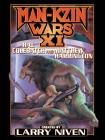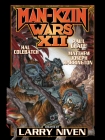Man-Kzin Wars XI by Hal Colbatch (ereader manga txt) 📗

- Author: Hal Colbatch
Book online «Man-Kzin Wars XI by Hal Colbatch (ereader manga txt) 📗». Author Hal Colbatch
Fury, puzzlement, impatience . . . and hope. He had become capable of waiting no longer.
There was a comet which he had marked out, a large and highly volatile one, plainly destined to a short life. Hiding as he might in its tail, he turned his ship and plunged back towards Ka'ashi.
* * *
A pod of dolphins broke surface in the car's flying shadow as the Ocean rolled away below. Dimity called them. The communicator was programmed to translate into Dolphin, and Dimity had picked up some of their concepts long ago.
They exchanged pleasantries, but with difficulty. During the decades of war many dolphins had come to maturity in the oceans of Wunderland with little knowledge of the human partners who had brought them as fellow enthusiastic colonists across interstellar space. Cooperation was being rebuilt slowly, and though the humans of Earth had employed some dolphins in their war-fleets as strategists it was hard to know how much these Wunderland dolphins knew—or cared—of the kzinti or current events. Still, they were friendly to the human walkers, and asked if, like their fathers, they might trade for hands. Dimity recorded their identities.
Little Southland was not very little. It was a detachment of Wunderland's southern continent, a knife-shaped triangle of land stabbing towards the South Pole, with a total area of 17,000 square miles, much of it cool to cold desert like Patagonia. With the temperate areas of Wunderland still empty or only sparsely settled, there was no need to cultivate it. There were some military installations and a few scientific ones.
Its population of avianoids was its main macrobiological interest. Varieties of creatures with vast striking beaks resembling the diatrymas of Earth's Eocene roamed it, and there were some introduced Earth birds, too: The "banana belt" of the northern coastal regions had a climate not unlike the south of New Zealand and there were a few ranches for reconstituted and slightly modified moas, strongly fenced in and over to protect them from the savage and powerful locals.
The car climbed. Vaemar and Dimity approached the land at about ten miles' height, searching with instruments.
"There!" A fuzzy radiation signature, but one that matched the record in the brick. Dimity tracked an optical telescope in.
"Nothing that shows on the surface," said Vaemar. "It would be hidden, of course."
"Granite everywhere. Hot granite. That won't make following a radiation trail easier."
They deployed a deep-radar scanner. A faint but unnatural grid of lines became visible. Vaemar grinned and his claws slid from their sheaths. "Prey," he said, and then: "We must give no cause for suspicion. Dimity, take over flying. If anyone contacts us, better that they see your face than mine."
There were interrogatory signals coming in from the scientific and military stations on the ground, but the car answered them automatically with the University's code and signature. They descended. Vaemar and then Dimity could make out the movement of life-forms on the surface. They changed into lightweight combat/utility suits, Vaemar's leaving his claws free, and Dimity adding a helmet with breathing mask, and landed.
Vaemar, followed by Dimity, stepped out into a landscape of grey, under a swirling grey sky, punctuated by rocks, and surrounded by rock walls and pillars, wind and rain-eroded into fantastic shapes reminiscent of dragons, sthondats and other great beasts of legend and fact. There was a thunderstorm dribbling lightning on the horizon. Distant hills were speckled with snow. Hardy, spiky vegetation grew about them. This was a cool wet plain, and days like this without high winds were rare. But life seemed reasonably abundant. Vaemar's eyes and the infrared detector in Dimity's face-mask found a number of small animals watching them from concealment, or in some cases burrowing frantically.
Dimity saw what she thought at first was a man approaching them, although the motion was wrong. She activated the binoculars in her helmet and pointed to the biped. An avian, or an avianoid creature, high, with great legs, atrophied wings and a mighty striking head and beak, standing, they could see, higher than Vaemar. To Dimity it resembled a holo of a carnivorous Earth dinosaur. It was making a high-pitched scream.
"Thunderbird," said Vaemar. "They must have good eyes. We have evidently invaded this one's territory." It was fast, and in Wunderland's gravity even those small wings could help it make great hops. Suddenly it was very close.
Dimity brought up her rifle, but Vaemar was quicker, and he gestured to her to leave it to him. He waited a few moments more, then fired as the thing leapt again. Its huge head shattered and its body slid towards them in a kicking ruin.
Almost on top of them, a second thunderbird erupted from concealment behind a rock wall. Vaemar's stride became a vertical leap. The thunderbird's huge hind-claws barely touched the ground, and it too leapt again, wings extended to show barbed claws, its colossal armored beak snapping and clashing at the kzin. Vaemar twisted in mid-air, avoiding the beak in a blur too fast for Dimity to follow, and landed on the creature's back. As they crashed to the ground together his jaws severed its neck in a single bite. The second thunderbird ran headless for a distance, wings flapping, before it collapsed.
"Perhaps those screams will call others," said Vaemar. "From what we know about them they are cooperative to some extent. However, we have no time to waste on game. Where is our real quarry?"
They surveyed the wilderness of rock.
"Caves are the best hiding-place from an aerial search," said Dimity. "But they have to be a certain size. There are no caves of such magnitude here."
"Caves are also obvious hiding places," said Vaemar. "If you have technology there are other ways of hiding."
"Bending light?"
"Or radar pulses. You see how much we think alike, Dimity? I do not need to explain things to you."
"Not a technology we've mastered. Not without a lot of bulky and obvious equipment."
"No. We haven't."
The portable deep-radar showed a maze of granite. The radiation signature they had





Comments (0)